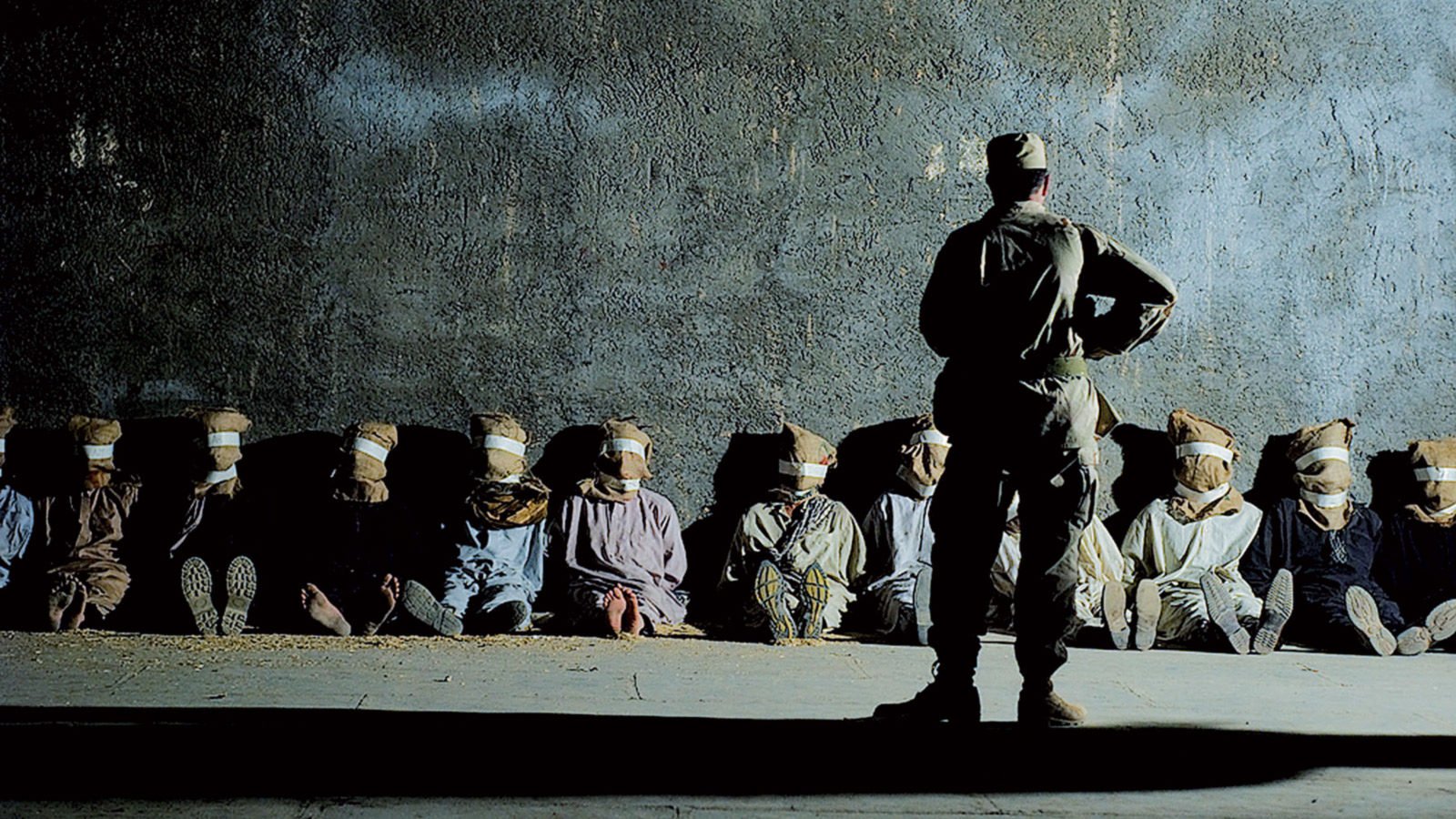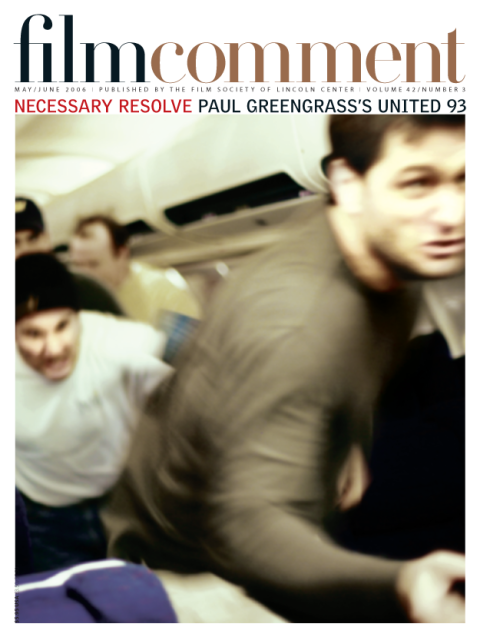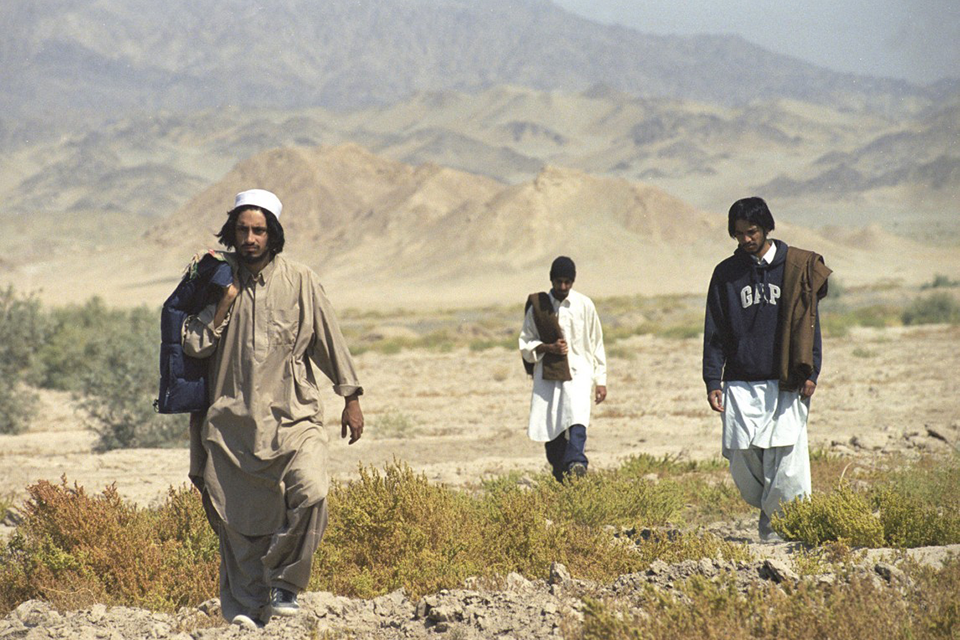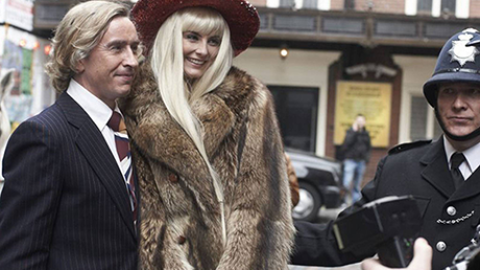By Paul Arthur in the May-June 2006 Issue

Review: The Road to Guantanamo
(Mat Whitecross & Michael Winterbottom, U.K., 2006)
Cinematic realism embraces an abundance of styles and production methods; Michael Winterbottom seems determined to try them all. In a lightning 10-year run, he has explored gritty period adaptation (Jude), torn-from-the-headlines dramatic exposé (Welcome to Sarajevo), kitchen-sink minimalism (Wonderland), classical neorealist tearjerker featuring amateur performers navigating real-life locales (In This World), and a faux making-of documentary (Tristram Shandy: A Cock and Bull Story). His latest version of the volatile marriage between fiction and nonfiction, The Road to Guantanamo, alternates talking-head monologues by three ill-fated Pakistani guys from the British Midlands with ultra-convincing reenactments—starring raw players of similar background—of their horrific two-year incarceration in America’s notorious prison camp for “enemy combatants” seized during the invasion of Afghanistan.

From the May-June 2006 Issue
Also in this issue
The story of the Tipton Three, a cause that generated considerable outrage in the U.K. but scarcely registered on our increasingly insular mediascape, opens like a slacker road movie: frat boys in the hinterlands, or Dumb and Dumber with skullcaps. Immediately after 9/11, Asif Iqbal (Arfan Usman) heads for rural Pakistan to check out the bride arranged by his mother. He convinces three friends to go with him and, hanging around in their homeland, they casually follow the injunction of a local mullah—at whose mosque they stay to “save money”—intent on aiding neighboring Afghans under attack by the U.S. Thus begins a trip to hell. Asif, Shafiq (Rizwan Ahmed), Ruhel (Farhad Harun), and Monir (Waqar Siddiqui) are shown as observant Muslims, twenty-something charmers completely detached from the religious and political fevers motivating, say, the London subway bombers. Indeed, despite a global tumult around 9/11 and the Blair regime’s support for military intervention, we hear nary a word concerning their thoughts or reactions to cataclysmic events exploding around them.
Naive travelers to a fault, they lurch from one place to the next, get sick, get lost, leave a buddy behind, find themselves bivouacked with Taliban fighters in a dusty village, and are swept up by Northern Alliance forces. After a brief stopover for random abuse at an Afghan detention center, they are flown to Cuba. Winterbottom wraps up this wrenching journey in under 30 minutes, then spends the rest of the film presenting matter-of-fact oral testimony backed by excruciatingly detailed, visually overheated scenes of physical and psychological torture, interrupted only by moronic interrogation sessions. Like a cross between Punishment Park and Midnight Express, the pummeling endured by the victims is mirrored metaphorically in the film’s jolting rhythms, quick cuts, and disorienting handheld movements. Shot in dv by resourceful cinematographer Marcel Zyskind, Guantanamo has the spontaneous look of eyewitness news footage hammered into blatantly fictional patterns of camera placement, editing, and so on. That is, while we can hardly doubt the veracity of what unfolds—it certainly comports with what we’ve seen and read of conditions at Gitmo—we also feel Winterbottom squeezing our vital organs of empathy in a stylistic vise. In one scene, Asif is chained to the floor in a stress position and assailed with a strobe light and heavy metal music, an image so culturally loaded it could have been lifted from the director’s 24 Hour Party People or 9 Songs. As is true of Asif and company, the heavier the hand, the greater the potential for resistance.

If Winterbottom’s primary aim was to personalize, to flesh out, as it were, an important episode in the ongoing barbarism of Bush administration foreign policy, he succeeds admirably: no longer can we relegate reports of prisoner abuse to a list of abstract numbers, faceless photos, or Orwellian parsings of the Geneva Conventions. That said, Winterbottom may have needlessly stacked his rhetorical deck. Documenting a reign of torture far worse than anything claimed thus far at Gitmo, Patricio Guzmán, in The Pinochet Case, concentrates on long-take close shots of survivors giving accounts of torture. Here the absence of archival footage or reenactments forces a deliberately uncomfortable bond with events that are essentially beyond adequate representation.
Winterbottom’s hybrid mix of fact and drama is at once vaguely familiar and imbued with troubling ethical issues. At the heart of my misgivings is his dodging of any reference to the attitudes of the Tipton Three toward 9/11 or American responses to the attack. By implying that his recent immigrants are unequivocally apolitical, that their adventures in Afghanistan were the result of idle curiosity, Winterbottom does his theme a disservice. Needless to say, it shouldn’t matter whether the subjects spent every waking minute in a public square screaming “Death to America” and for relaxation told anyone within earshot how many infidel throats they planned to slit. Assuming they weren’t part of Osama’s inner circle or had direct knowledge of an imminent terror attack, they deserved basic human rights supposedly guaranteed by our system of justice. By making the easiest case for injustice—touting three enormously appealing fellows who wouldn’t know Osama from Barack Obama—Winterbottom sidesteps obligations associated with documentary filmmaking in favor of blazing agitprop.
Incidentally, after The Road to Guantanamo won a Silver Bear at this year’s Berlin festival, the three friends and assorted cast members were questioned by police at a London airport upon their return. One of the actors said he was denied access to a lawyer and was badgered about future roles in “political” films. You can’t make stuff like this up.





